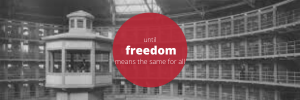Have you ever considered the freedom you have to socially distance, quarantine, or wash your hands regularly? Have you thought about your free access to testing? Those who are incarcerated aren’t granted the same freedoms – simple freedoms which can prevent the spread of COVID-19.
COVID-19 awaits no background check and requires no gate pass. Its life is sustained through shakedowns and handshakes, the passing of styrofoam trays, tight quarters, and close proximity. It is as inclusive as it is intrusive. It makes a place, usually protected from inside and outside harm, like Stateville Correctional Center outside of Chicago, one of the deadliest places to be in the midst of a global pandemic.
At the time of this writing, the Illinois Department of Health confirmed 282 cases and 16 deaths of COVID-19 between staff and incarcerated people at Stateville, the facility where North Park Theological Seminary offers certificate courses and a master’s degree to over 80 inside and outside students. Two of those deaths includes a first and second-year student of North Park’s master’s program. A cellhouse that was shut down in 2016 because of health and safety concerns was even reopened to house COVID patients. With an inability to socially distance, little-to-no access to soap and hand sanitizer, and under-resourced medical support, residents and staff at Stateville and correctional centers across the nation are left wondering not “if” but “when” the virus will reach them and what will be the damage.
How can we respond as the Evangelical Covenant Church? How do we lament broken systems that see little value in our sisters and brothers who are incarcerated? What can we do when we feel helpless? Hebrews 13:3 calls us to “continue to remember those in prison as if you were together with them in prison, and those who are mistreated as if you were suffering.”
We can remember our brothers at Stateville, and those incarcerated and working inside institutions around the US, by praying and engaging in the following ways:
- Pray
- Pray for health and protection from the virus for those who are incarcerated and for the officers/staff members.
- Pray for the loved ones of those incarcerated, as interaction is limited and communication is slow.
- Pray for decision-makers at the local, state, and federal government to remember those in prison when considering the prevention and spread of the virus.
- Engage
- Donate funds to support our students through the supply of soap and hand sanitizer into Stateville as well as other needed resources and supplies.
- Write letters of encouragement to inside students at Stateville. Email Melissa Pavlik at mpavlik@northpark.edu for more details.
- Call your Governor and State Officials with this brief statement: “Hi my name is _________ and I am a resident of [your state]. I am calling to ask that Governor ________ take prompt action to release as many people as possible from prison as soon as possible in light of the threat that COVID-19 poses to incarcerated populations. Thank you.”
- Reach out to local reentry organizations and prison ministries to support their efforts during this crisis and see how you can help. Click here for a state-by-state list of re-entry programs.
Until freedom means the same for all,
The LMDJ Team


